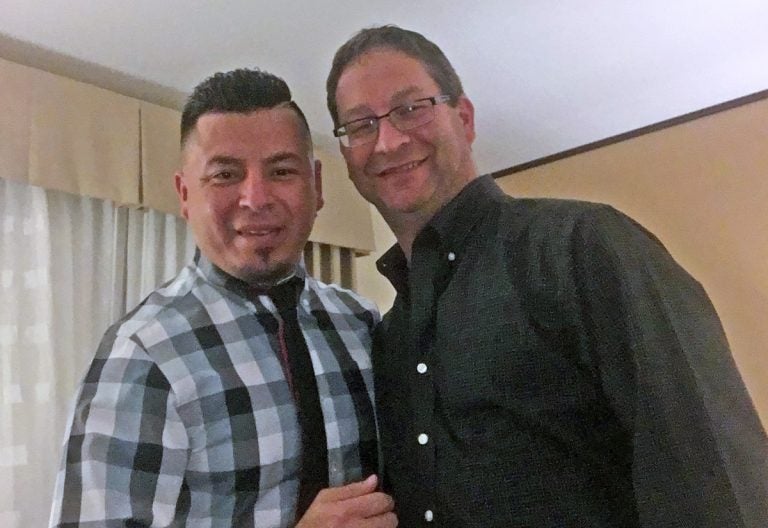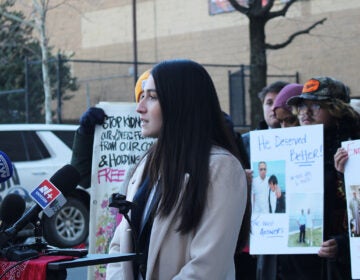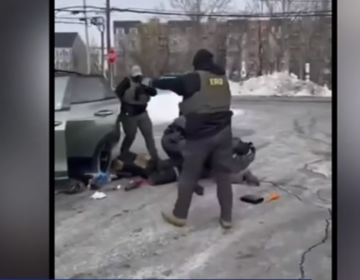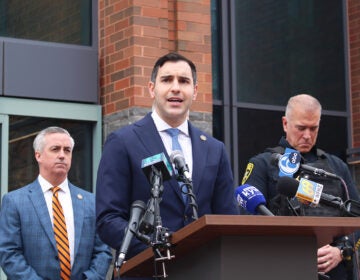Will Chesco man’s arrest at green card interview scare off undocumented immigrants trying to legalize status?
On Jan. 31, when Jose Nuñez Martinez showed up in Philadelphia for a mandatory interview to adjust his status, U.S. Immigration and Customs Enforcement officers arrested him.
Listen 1:30
On Jan. 31, when Jose “Ivan” Nuñez Martinez and Paul Frame showed up in Philadelphia for a mandatory interview to adjust Martinez's immigration status, U.S. Immigration and Customs Enforcement officers arrested him. (Provided)
Paul Frame describes his marriage to Jose “Ivan” Nuñez Martinez, 37, as yin and yang, opposites attracting.
Frame is 15 years older and talks eagerly, while he says Nuñez is soft-spoken and laid back. And while Frame grew up in rural Chester County, helping with his parents’ cattle auction business, Nuñez fled his home in Michoacán, Mexico, and at least twice crossed the border into the United States illegally.
After their marriage made Nuñez eligible for a green card, Frame pushed his husband to start the application process. Nuñez was nervous.
“He works 12 hours a day, he gets up at 3, leaves here at 3:30 in the morning for 12 hours,” Frame said. “I said, ‘If you get legal, you don’t have to do that sh– anymore.’ ”
On Jan. 31, when the couple showed up for a mandatory interview to adjust his status, U.S. Immigration and Customs Enforcement officers arrested him.
The offices of U.S. Citizenship and Immigration Services, a different federal agency that issues visas and green cards to immigrants, have become a more perilous site for unauthorized immigrants applying for those benefits since President Donald Trump took office. Unauthorized immigrants on the path to gaining lawful status are not guaranteed protection from deportation during that process. However, under President Obama they were generally treated as a low priority for ICE. In a January 2017 executive order, Trump expanded enforcement priorities to include any immigrant in the country illegally putting green card seekers at greater chance of detention and deportation.
“It is the standard practice of USCIS to notify ICE if we have individuals at our offices who have warrants of deportation or are in proceedings,” said USCIS spokeswoman Anita Moore. ICE officials said they arrested Nuñez because he had previously been deported, in 2010. Coming back to the U.S. after a deportation can result in criminal charges for “illegal reentry,” although Nuñez’s attorneys say no charges have been filed and he has no criminal record. ICE officials also said while they do not track arrests at USCIS, the other agency’s offices are not considered “sensitive locations,” places such as schools and churches where ICE avoids making arrests. “ICE Deputy Director Thomas Homan has made clear, ICE does not exempt classes or categories of removable aliens from potential enforcement,” said officials.
Before the president expanded immigration enforcement, simply having a removal order — as Nuñez did — would not typically lead to an arrest at USCIS, according to immigration attorneys contacted for this story.
Frame and attorneys with Audrey Allen Immigration Law, the firm representing Nuñez, said his arrest also blindsided them.
“I was very confident going into that hearing,” said Frame, his voice tightening. “I’m the one who told him to get legal.”
Immigration officers took Nuñez to York County Prison, where ICE holds immigrants it arrests and places in deportation proceedings. Nuñez has requested asylum, based on the fear that gangs will threaten or harm him based on his sexuality if the U.S. deports him to rural Mexico. His sister, who is also queer, has gone into hiding in Mexico to avoid threats of violence.
Immigration attorney Mary Chicorelli also had a client arrested at USCIS during a spousal interview in mid-January. Her client, who she declined to name because his extended family does not know about his arrest, had a criminal conviction, making his detention less unusual. After he was taken to immigration detention in York, he was released on bond and is continuing to work toward a green card.
Chicorelli said she fears immigrants who qualify under U.S. statute to become lawful residents will be deterred by such arrests.
“It becomes not just about the chilling effect on everyone who’s applying for green cards, it’s everyone else that has every right to an immigration benefit but won’t do it because they’re scared,” she said.
That sentiment rings true to Frame.
“In hindsight, I would have never went to the hearing. I would have never went in that building,” he said. “But like I told Ivan today, we can’t look back.”
Juntos, an immigrants rights group based in Philadelphia, and GALAEI, a group that advocates for LGBT Latinos, have launched a petition to pressure ICE to release Nuñez from detention.
After the arrest, USCIS did bring one piece of good news: the petition to certify the marriage of Nuñez and Frame as bona fide was approved, making Nuñez eligible for a green card.
—
Editor’s note: This story has been updated to reflect new information provided by U.S. Immigration and Customs Enforcement.
WHYY is your source for fact-based, in-depth journalism and information. As a nonprofit organization, we rely on financial support from readers like you. Please give today.




